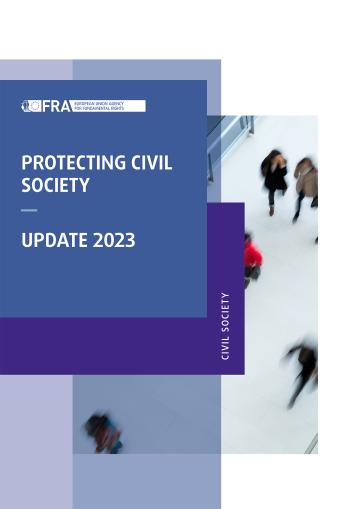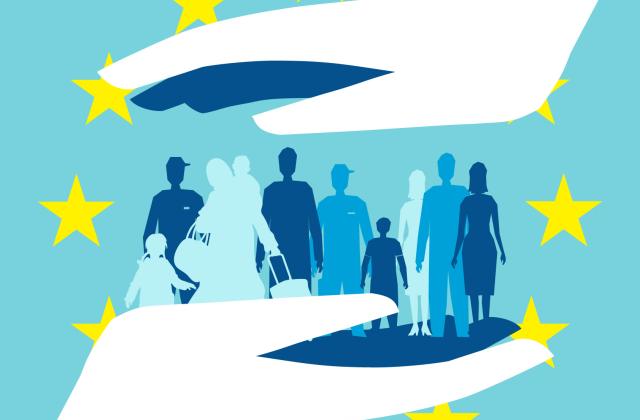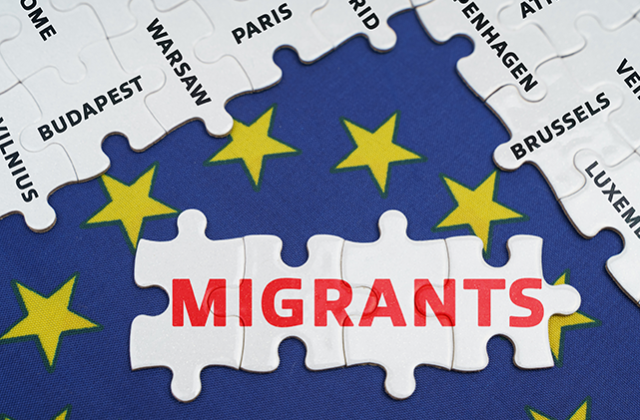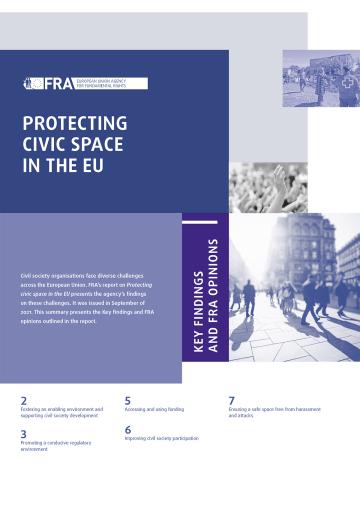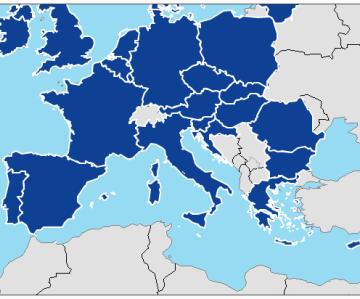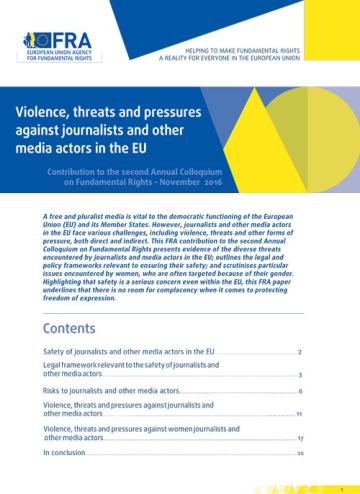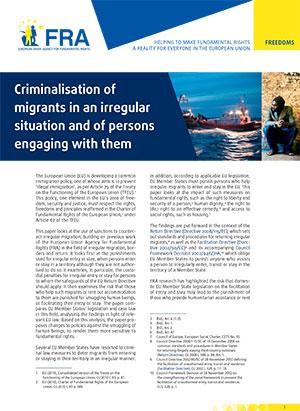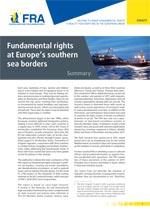Civic space is the environment that enables civil society to play a role in political, economic and social life of our societies. In particular, civic space allows individuals and groups to contribute to policy-making that affects their lives.
OHCHR (n.d.), ‘OHCHR and protecting and expanding civic space’.
European institutions and international and regional human rights organisations emphasise the important role of civil society in safeguarding and promoting human rights and democracy. Yet civil society organisations (CSOs) face diverse challenges across the EU that hamper their ability to uphold human rights.
A vibrant and engaged civil society supports the implementation of EU policies in many areas that are key for upholding and protecting fundamental rights. Such policies include the EU Strategy to strengthen the application of the Charter of Fundamental Rights in the EU (the Charter); the European Democracy Action Plan; and relevant action plans on anti-racism, lesbian, gay, bisexual, transgender, intersex and queer and other minority gender identities and sexualities (LGBTIQ+) equality, Roma inclusion, the rights of the child, disability, victims’ rights, gender equality and migrant integration.
The European Union Agency for Fundamental Rights (FRA) has pointed to a number of significant hurdles for CSOs and human rights defenders since it issued its report Challenges facing civil society working on human rights in the EU in 2018, and in its subsequent annual updates. CSO and human rights defenders face threats and attacks, excessive legal and administrative restrictions, insufficient resources and access to information, and are often not properly involved in policy and decision-making. At the same time, there is increasing awareness among policy makers in the EU and the Member States about the situation and the need to address it.
This report highlights key developments regarding the civic space in the EU in 2022. The analysis draws on research carried out by Franet in 2022 resulting in country reports on relevant legal and policy developments in all 27 EU Member States and in three accession countries; the responses of over 400 civil society organisations, umbrella organisations and networks to the Agency’s annual consultation 2022 on civic space; and focus groups, meetings, interviews and desk research.
Although civic space thus goes well beyond CSOs, this report is based on evidence that FRA collected from and about organised civil society. According to the United Nations (UN) guidance note on the protection and promotion of civic space from 2020, “civic space is the environment that enables people and groups – or ‘civic space actors’ – to participate meaningfully in the political, economic, social and cultural life of their societies”.
Based on evidence collected by FRA, the nature and depth of challenges that CSOs face vary across Member States. However, across all Member States, CSOs express concerns in FRA’s annual consultations and indicate that a number of problems identified have persisted in recent years. For 2021 and 2022 in particular, their responses were overall more negative than in other years because of the impact of measures to tackle the COVID-19 pandemic.
However, FRA also has identified a range of positive developments that have fostered an enabling environment for the promotion of human rights and democracy. In the past five years, understanding of the challenges that CSOs face has been more widely acknowledged. In 2022–2023, all three major EU institutions acknowledged for the first time civic space pressures in the EU in official documents (the European Parliament resolution on civic space in the EU, the European Commission report on the application of the Charter and civic space and the Council conclusions on the role of the civic space in protecting and promoting fundamental rights in the EU). Donors – including the European Commission and the European Economic Area and Norway Grants – increasingly provide funding with a focus on addressing civic space challenges.
Several Member States have set up or improved their structures and processes for ensuring meaningful civil society engagement. CSOs themselves increasingly speak out about attacks against them and cooperate more closely in face of pressures on them and their work.
A legal environment conducive to ensuring an open civic space requires a strong legislative framework that protects and promotes the rights to freedom of association, peaceful assembly and expression, in conformity with international human rights law and standards - notably Article 11 and 12 of the Charter, Article 10 and 11 of the European Convention on Human Rights (ECHR), and Articles 19, 20 and 21 of the International Covenant on Civil and Political Rights (ICCPR). The UN Declaration on Human Rights Defenders, although not legally binding, contains principles and rights that are based on human rights standards enshrined in other legally binding international instruments.
Developments in the legal environment affecting CSOs vary across EU Member States. A decrease in challenges related to emergency laws is visible from 2020 and 2021 to 2022, corresponding to the gradual lifting of the emergency provisions adopted in response to the COVID-19 pandemic. Other legal challenges remained similar to those encountered in previous years, with CSOs reporting issues related to accessing information (32% of respondents), legislation regarding civil dialogue (23%), and tightening of rules on assemblies and association (21%). Other issues raised included the disproportionate use of police powers and negative side effects of legislation in the areas of data protection, transparency and lobbying, tax and charitable status, counter-terrorism and anti-money laundering. A particular challenge concerns strategic lawsuits against public participation (SLAPPs). These are unfounded or abusive court procedures against natural or legal persons engaging in public matters whom the claimant wants to silence. CSOs sometimes face SLAPPs when they take positions on issues in their advocacy work, for example when someone claims to have been defamed by their public statements. This may have a chilling effect on their willingness to work on certain issues.
Positive developments include continued efforts in a few countries to improve the legal frameworks for exercising the right to peaceful assembly, to modernise existing rules and ease bureaucratic requirements for CSOs, and to reform registration systems and rules regarding public benefit status.
At the EU level, the European Commission dedicated its annual report in 2022 on the application of the Charter to the topic of civic space; A thriving civic space for upholding fundamental rights in the EU. The European Commission also proposed, a directive and a recommendation against SLAPPs, a directive on cross-border associations and a media freedom act.
Ways forward
As part of their action to strengthen the application of the EU Charter of Fundamental Rights (the Charter) and the rule of law, EU institutions should regularly monitor the civic space in the EU, closely involving civil society actors and other human rights defenders. The methodology of the European Commission’s ‘CSO Meter’, applied in Eastern Partnership countries, could be adapted for this purpose. The monitoring results could be included in the European Commission’s annual rule of law reporting and in its reports on the implementation of the Charter.
EU institutions and Member States, when acting within the scope of EU law, should ensure that both EU and national laws uphold the rights to freedom of expression, peaceful assembly and association. Furthermore, they should ensure that the transposition and application of EU rules do not result in disproportionate restrictions on civil society activities. The European Commission should continue bringing infringement proceedings where necessary to protect the civic space and ensure that rulings by the Court of Justice of the European Union are fully implemented.
Furthermore, the European Commission should conduct ex ante assessments and consistently involve civil society and other relevant stakeholders are in these assessments. The European Commission should ensure civil society are engaged in any consultation during the preparation or review of EU legislation. This ensures that provisions that potentially affect civic space and civic freedoms can be detected early on. It would also help ensure that excessive limitations to civil society space resulting from incorrect transposition of directives are detected so they can be remedied.
The EU and Member States should also ensure that legislation does not unnecessarily restrict civic space, and that it complies with international human rights standards and principles. For example, Article 10 ECHR and Article 19 ICCPR (freedom of expression) and Article 11 ECHR and Articles 21 and 22 ICCPR (freedom of assembly and association). Human rights CSOs and their members need to be able to exercise their rights fully and without unnecessary or arbitrary restrictions on carrying out their work. CSOs therefore need states to fully implement their positive obligation under international human rights standards, including in particular the freedom of expression, peaceful assembly and association. An enabling environment allows CSOs to fully enjoy their rights, including the right to access public funding and resources, and the right to take part in public affairs.
As discussions on the Commission’s anti-SLAPPs proposal are ongoing, Member States should take effective measures against SLAPPs, to fulfil their obligations to uphold the rights to freedom of expression (Article 11 of the Charter) and association (Article 12 of the Charter), among other reasons. Such measures should include reviewing existing legislation to limit the use of SLAPPs. Furthermore, practitioners in the legal field, including both judges and lawyers, should be adequately trained on aspects of freedom of expression to enable them to recognise and appropriately address SLAPPs.
Threats and attacks against CSOs and human rights defenders by both public and private players persisted across the EU in 2022, targeting organisations, staff and volunteers.
Threats and attacks take multiple forms. Public authorities use SLAPPS, unnecessary administrative hurdles, smear campaigns, the criminalisation of certain activities and excessive surveillance, CSOs report. About half of respondents to FRA’s consultation report receiving verbal threats offline and online, intimidation and harassment, and 5 % report physical attacks. FRA’s 2022 findings show that the patterns of threats and attacks persist across the EU, with no significant improvements from previous years.
In several Member States, CSOs and human rights defenders working in specific policy areas report they are increasingly subject to hostile environments, with intimidation, legal proceedings and smear campaigns against their work. This particularly affects migrant rights defenders, LGBTIQ+ rights defenders, women’s rights defenders, sexual and reproductive health and rights defenders, environmental rights defenders, anti-racism activists and child rights defenders, as FRA’s research for this report indicates. Surveillance was also a prominent topic in 2022. Following alleged abuses in the use of Pegasus and similar surveillance software against a variety of targets, including CSOs, the European Parliament set up a committee of inquiry.
Ways forward
Member States should encourage that crimes committed against CSOs and human rights defenders are reported, and ensure they are properly recorded, investigated and prosecuted.
Building on the existing external EU human rights defenders mechanism, the EU could consider setting up a similar mechanism for inside the EU. Such a mechanism should allow CSOs and human rights defenders to report attacks, register alerts, map trends, build capacity, and provide timely and targeted support to victims. In this context, there is also a need for Member States to establish, bolster and strengthen national level protection mechanisms which would help detect = and act in response to - attacks and reprisals against human rights defenders. According to the Paris Principles, National Human Rights Institutions have a role in protecting and supporting other human rights defenders and CSOs.
Member States should refrain from criminalising or taking legal or non-legal actions that unduly hamper the operation of CSOs, including those providing legal, humanitarian and other assistance to asylum seekers and other migrants, or undertaking search and rescue (SAR) at sea. The European Commission should continue to pay the utmost attention to threats against CSOs and human rights defenders, including in its bilateral discussions during the preparation of its annual rule of law report and the related country-specific recommendations.
The European Commission and Member States should raise awareness among justice authorities and practitioners of the negative impact of SLAPP practices. Considering their existing fundamental rights obligations to promote the freedom of expression and association Member States should take all required measures, including legislative ones, to prevent and effectively address SLAPPs.
CSOs’ work is essential for strengthening democracy, addressing complex issues, promoting innovation and encouraging local solutions. Their work contributes to building capacity, fostering collaboration and partnerships and ensuring long-term improvements in human rights. This important work needs to be adequately resourced.
Access to resources is therefore an integral part of the right to freedom of association, as defined in Article 22 ICCPR and other human rights instruments. The concept of ‘resources’ is broadly defined to include financial assistance, material resources, access to international funds, solidarity, the ability to travel and communicate without undue interference, and the right to benefit from the protection of the state.
However, in practice access to resources remains an ongoing concern for CSOs, as regards both the availability of funding relevant to their work and the accessibility of such funding due to bureaucratic requirements. FRA’s consultation shows that the major challenges for national and local organisations in 2022 were connected to difficulties in finding funding relevant to their work (67 %). Other recurrent difficulties concern applying for funding (complicated application procedures, limited administrative capacity to apply) (42 %), using the funding received (lack of core funding, lack of follow up funding, too short funding cycle) (33 %) and accessing funding (publicly available information difficult to find, overly restrictive eligibility criteria, rules on foreign funding) (32 %).
Rules on limitations to foreign funding constitute an additional obstacle to the functioning of CSOs. As the OSCE/ODIHR-Venice Commission Joint Guidelines on Freedom of Association note, “[a]ssociations shall have the freedom to seek, receive and use financial, material and human resources, whether domestic, foreign or international, for the pursuit of their activities.” Overall, donors have gradually started to adjust their funding to take into account the needs of CSOs, giving more consideration to advocacy on civic space, and capacity building particularly for security-related issues.
One significant change from previous years is that the European Commission has considerably stepped up its efforts to fund CSOs working on human rights issues, in particular through the Citizens, Equality, Rights and Values (CERV) programme. This programme is the largest to date supporting civil society in the EU, and pilots more flexible funding approaches.
Ways forward
EU institutions and Member States should ensure that the legal and policy environment is conducive to the possibility of CSOs having access to diverse pools of resources. They should also make sure that EU and Member State rules for EU-based CSOs’ access to funding from domestic or foreign sources respect the principle of proportionality and comply with EU primary law. Financial support offered should cover the full range of civil society activities, beyond service provision, covering advocacy and watchdog functions, capacity building, litigation, cooperation and network building, peer exchange across borders, community engagement, resilience and security.
Beyond project funding, core funding and multiannual funding cycles could strengthen civil society and ensure the sustainability of its human rights work. It is crucial that funding becomes readily available and accessible for grassroots organisations.
The European Commission should continue to ensure that rules regulating CSOs’ access to and use of foreign funding comply with Article 63 of the Treaty on the Functioning of the European Union (TFEU) and Articles 7, 8 and 12 of the Charter. It should also make sure that they respect the principle of proportionality and overall comply with EU primary law as interpreted by the Court of Justice of the European Union. Moreover, the EU and its Member States could reinforce efforts to promote the exchange of information and good practices in this area, involving CSOs to enable them to share their experiences.
The right to participation in public affairs is recognised in Article 25 of the International Covenant on Civil and Political Rights, among other documents. Civil participation is defined as “the engagement of individuals, NGOs and civil society at large in decision-making processes by public authorities”. In addition, all EU Member States have signed up to the Sustainable Development Goal targets, and Sustainable Development Goal (SDG) 16.7 aims to “ensure responsive, inclusive, participatory and representative decision-making at all levels”. Moreover, under Article 11 of the Treaty on European Union (TEU), the EU – and its Member States when implementing EU law and policies - are obliged to give “citizens and representative associations the opportunity to make known and publicly exchange their views in all areas of Union action” and to “maintain an open, transparent and regular dialogue with representative associations and civil society”.
Many Member States initiated or consolidated participation mechanisms in 2022, both at national and local levels. Notwithstanding, procedures for CSOs to participate effectively in policymaking and decision making remain patchy, and CSOs are often unable to access relevant information or clear standards or guidelines to support their contribution. The quality of the consultation processes varies. Considerable differences emerge between national and EU consultations. Some 58 % of the responding organisations found the quality of EU consultations acceptable, while the percentage was 38 % for national consultations.
Other challenges that CSOs face include the limited interest of policymakers in consulting meaningfully, difficulties in accessing consultations, weaknesses in the consultation process itself, insufficient feedback on follow-up after consultations and the insufficient capacity of organisations to contribute to consultations, including due to a lack of funding for such processes. These challenges are exacerbated for organisations working with those at risk of exclusion.
However, in general the principle of cooperation between CSOs and public authorities in ensuring the implementation of laws and policies related to fundamental rights has been strengthened in recent years. The EU Strategy to strengthen the application of the Charter, and many sectorial EU action plans and strategies, call for the engagement of CSOs in the design, implementation and evaluation of relevant measures. Partly reflecting the positive experiences of cooperation during the COVID-19 pandemic and the response to the Russian war of aggression against Ukraine, Member States have developed additional initiatives promoting the more meaningful cooperation with and participation of CSOs. Nevertheless, cooperation is often ad hoc and incident-specific, as FRA’s evidence shows, for instance in the field of hate crime reporting.
Ways forward
To implement Article 11 of the TEU, the EU could consider establishing a dedicated EU policy framework with common guidelines allowing for open, transparent and regular dialogue between the EU institutions and civil society at EU, national and local levels. It should include funding for appropriate processes, training of officials, and regularly organising consultations and exchanges, including through the representations of the European Commission and the European Parliament in the Member States. It should emphasise access to information and the participation of CSOs representing excluded or underrepresented groups.
There is a need to develop sustainable and structured, institutionalised forms of cooperation, and to establish a culture of trust and transparency; respect CSOs’ independence; ensure CSOs’ broad representation and inclusive participation; and formalise commitments, including through institutional arrangements, ensuring the sustainability of cooperation.
There is also a need to ensure adequate financial and technical support for CSOs and human rights defenders to take up participation, consultation and dialogue opportunities. Specific measures are necessary to reach out to marginalised and excluded groups.
Finally, Member States are encouraged to involve civil society and other fundamental rights actors in the monitoring of the Charter’s implementation. The 2021 Common Provisions Regulation (governing eight large EU funds) introduced compliance with the Charter as an ‘enabling condition’. Moreover, the Common Provisions Regulation and the Commission’s European Code of Conduct on Partnership call for strong partnerships, including with CSOs.
